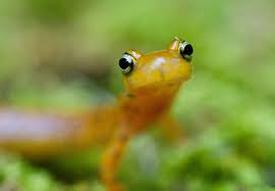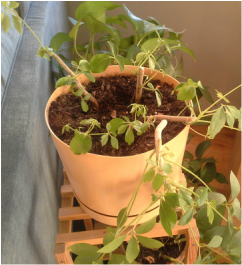 Of all the surprising designations you might imagine, it turns out that 2014 was the year of the salamander. Who knew? This according to an article on National Geographic’s website, which points out the richness, diversity, and value of salamanders. I haven’t given a lot of thought to the “awesome salamander”—you may not have, either. But certainly we’ve all given some thought to at least one of the many species living in the deserts, forests, oceans, or even rescue centers right now. Although the article highlighted salamanders, the author’s description of these little beings could apply to any living thing in the world today: Each creature is distinct; each creature has a special purpose unique to them; each creature, no matter how small, is important to the environment in which it lives. Sadly, from coral reefs to salamanders, these loved creatures are facing decline and even extinction. How can we best pray for the fauna and flora? A spiritual view of things is a great place to start. How does God, divine Spirit—the one and only Creator—see every object in His infinite, spiritual creation? When his work was complete, “God saw every thing that he had made, and behold, it was very good” (Genesis 1:31). You may think “very good” isn’t a “very exciting” description. But when you consider that God is Good itself, that means He was declaring that all of His loved creation is like Him—complete and magnificent! Each spiritual idea, from an easy-going elephant to a scurrying salamander, has a necessary part in expressing God’s awe-inspiring nature. Since God is infinite Mind, the existence of each spiritual idea in His mental creation is imperative. Without any one of those ideas, God’s expression of Himself would be incomplete. Therein lies the spiritual permanence of each of God’s creatures—great or small. Mary Baker Eddy speaks of this permanence in her book, Science and Health with Key to the Scriptures: “All of God's creatures, moving in the harmony of Science, are harmless, useful, indestructible” (p. 514). Seen from this spiritual viewpoint, every plant, insect, and animal—living in the deepest ocean, or on the highest mountaintop—is harmless, in other words, without harm. That means they are as incapable of inflicting harm as they are of experiencing it. All spiritual ideas are useful; every living creature is the spiritual proof that God is acting, knowing, and being. Each of Spirit’s loved ideas is indestructible; it is never subject to oblivion, because God is eternal Mind and all of His creation is kept safely in thought. He delights in all of His creatures too much to allow extinction to exist in His universe. I love Mrs. Eddy’s view of the relationship between God and His forever-loved creation: “Love giveth to the least spiritual idea might, immortality, and goodness, which shine through all as the blossom shines through the bud” (Science and Health, p. 518). We can rest assured—whether it’s a salamander, seahorse, or any spiritual idea—there can be no decline, destruction, or extinction for any of them. All are kept safe in the protective embrace of God, divine Love. Scurry over to my mountaintop moments page to see photos of adorable baby Chameleons! All Things Bright and Beautiful
by Cecil F. Alexander 1848 All things bright and beautiful, All creatures great and small, All things wise and wonderful: The Lord God made them all. Each little flow’r that opens, Each little bird that sings, He made their glowing colors, He made their tiny wings. The purple-headed mountains, The river running by, The sunset and the morning That brightens up the sky. The tall trees in the greenwood, The meadows where we play, The rushes by the water, We gather every day;-- He gave us eyes to see them, And lips that we might tell How great is God Almighty, Who has made all things well. All things bright and beautiful, All creatures great and small, All things wise and wonderful: The Lord God made them all.
0 Comments
 I don’t have a green thumb. Although I do have a few plants, they’re survivalists in my house. A few weeks ago, I noticed one of my Schefflera plants had gotten spindly and sparse. I found some sharp clippers and started cutting. Before I knew it, I had a big pot of dirt with some sticks coming out of it. I felt bad. What had I done to that poor plant?! The incident reminded me of a passage from the Bible in the book of John that says, “He cuts off every branch in me that bears no fruit, while every branch that does bear fruit he prunes so that it will be even more fruitful” (John 15:2, New International Version). What does this “pruning” look like in our lives? I see it this way: Because God causes us to express Him perfectly, whatever isn’t like Him falls away—is purged from us. God doesn’t allow any spindly sparseness in His creation, because it’s not like Him. God’s creation only includes that which is productive and leads us to Him—promotes our spiritual growth. He has created us to express Him in all His abundance and power. Without us, His spiritual image and likeness, “He would be without a witness or proof of His own nature” (Science and Health with Key to the Scriptures, p. 303). Some years ago, I had a friendship that looked a lot like that spindly plant I trimmed back. It had potential to grow, and I was waiting to see if it would. But it left me feeling unsatisfied, like a plant that was going in every direction but up. It wasn’t producing joy, satisfaction, and spiritual growth. Although it might seem obvious that the relationship needed a change, it wasn’t to me at the time. Like the plant, it existed, and it looked OK on the surface. I guess I wasn’t sure if it needed pruning, but I was open to it. Demanding a change in a friendship—sometimes even needing to end it—is difficult. You might even see what needs to happen, but you don’t have the courage to follow through. Or, you may think it’s going to take a productive turn at any moment, so you stick with it. That’s how it was with me. I just wasn’t sure what needed to happen. So, I did what I always do when I don’t know what to do: I asked God to help me. My prayer at the time was a simple one. It revolved around a psalm that says, “Whom have I in heaven but thee? And there is none upon earth that I desire beside thee. My flesh and my heart faileth: but God is the strength of my heart, and my portion for ever. It is good for me to draw nigh to God” (Psalms 73:25, 26, 28). And that’s what I did. Every day I affirmed that my only desire was to know God better—to draw nearer to Him. Whatever was in my life that promoted that goal, I wanted. Whatever didn’t promote a better understanding of God and myself as His offspring, I was willing to part with. The shortened version of my prayer was, “Prune me, God!” After some months, I started to notice that I wasn’t as interested in that relationship as I had been. There was no conversation that ended it. Like my plant’s spindly and sparse branches, the friendship was pruned away. I appreciate God’s help in that trimming work. And the result has been new growth. Other friendships that have been productive and satisfying have taken its place. So what about my little plant? It’s growing, too. Not many days after I cut it back I saw a tiny green sprout on one of the bare sticks. I clapped and encouraged it! A few days later, I saw many more sprouts. Today, it’s well on its way to being full and productive. I was happy to experience new growth, and it looks like my plant is, too.  Some citations to consider in your own pruning lesson: The Bible: Psalm 73:25,26,28 Psalm 51:7 Science and Health: 303:25-30 Miscellaneous Writings by Mary Baker Eddy: 151:6-9 |
AuthorI hope these insights will inspire readers to think more spiritually about themselves and the world around them! Archives
July 2018
Categories
All
|
 RSS Feed
RSS Feed